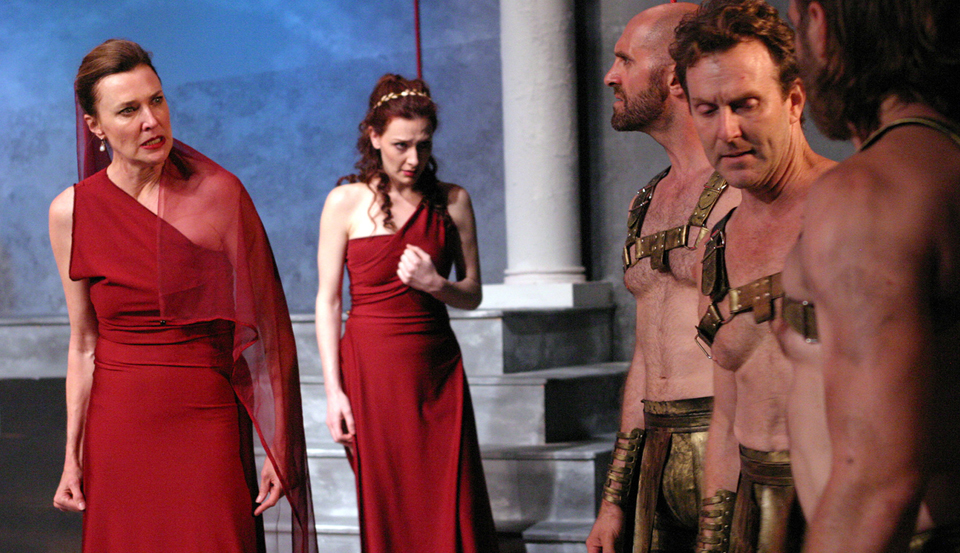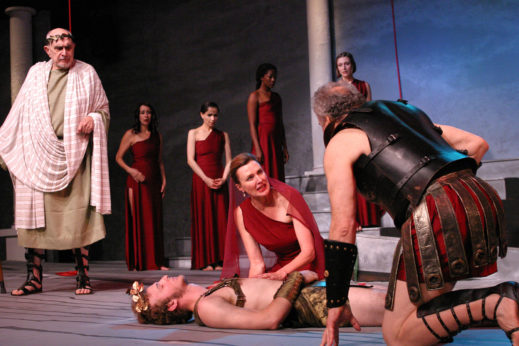
LOS ANGELES—“Updated” and “re-imagined” versions of classics often misfire but like the transformation of Romeo and Juliet into West Side Story, Eduardo Machado’s reworking of Aristophanes’s Lysistrata is one of the best. With Lysistrata Unbound, the Cuban playwright has transformed the comedy into a Greek tragedy for our own militarized times, but in doing so definitely retains the spirit of this biting 411 BCE satire—as Spike Lee did in Chi-Raq, his 2015 anti-gun, anti-gang violence film adaptation of Lysistrata.
Unlike other “remakes,” Machado’s rendition takes place in the original time and place. The large cast wears period costumes designed by Denise Blasor and Josh La Cour. Mark Guirguis’s simple set includes Greek columns; courtesans and other Athenian women wear toga-like garments, while the men are mostly in warrior garb, although apparently with clever camouflaged shorts beneath their leather aprons or skirts. As their haute couture is fairly revealing and Lysistrata Unbound also includes language and acts of a sexual nature, this candid production is not age appropriate for children.
Machado and director John Farmanesh-Bocca have accentuated the anti-war nature of the source work but stressed the tragic elements beyond Aristophanes’s comedic original. In doing so they seem to have added elements of Aeschylus’s Greek tragedy Prometheus Bound. Another way they have emphasized the catastrophic is by making the lead character an ancient incarnation of Cindy Sheehan, the prophetic peace activist whose son, U.S. Army Specialist Casey Sheehan, was killed during the Iraq War—a conflict even more unnecessary and mendacious than Athens’s clash of the titans with Sparta during the Peloponnesian War.
Desperate Housewives and Supergirl actress Brenda Strong joins the ranks of other screen stars, including Tom Hanks, Joe Morton, Jeremy Irons and Lesley Manville, currently treading the boards of L.A. stages in our theater-rich metropolis. The aptly named Strong is stupendous as Lysistrata, playing her as a desperate housewife/sister/mother who has lost loved ones to combat and is frantic to end not only the Peloponnesian but all wars forever. The title character is almost driven mad by her young son’s death—call it “post-Spartan depression.”
But her despair turns to anger and Lysistrata acts to end the senseless carnage. To do so, like a labor organizer of antiquity, Lysistrata orchestrates the most famous sit-down strike in history. Like an avenging angel, the Athenian female who has lost a son, brother and husband to the war with Sparta prevails upon the wives, lovers and ultimately prostitutes of Athens to refuse to have sex with men until they put down their arms.
In his immortal Ode on a Grecian Urn British poet John Keats rhapsodized that: “Truth is beauty and beauty truth.” Here, Aristophanes and his 21st-century counterpart Machado have put their finger on an essential, eternal truth that was articulated by 20th-century pacifists as “Make love, not war.” In Civilization and Its Discontents Freud counterpointed the Greek god of sexual attraction Eros against Thanatos, the Greek mythological personification of death. Sex, the source of procreation, is the opposite of death, the end of life, and as such, is opposed to warfare.

Just as Cindy Sheehan discovered when she camped out near Bush’s pseudo-ranch in Texas, Lysistrata faces the steep price paid for publicly speaking out in a so-called “democracy.” For in ancient Greece—as in 21st-century America, which, in comparison with Athens, is weaponized and militarized on steroids, with about 750 overseas military bases bestriding the globe like a colossus—citizens have freedom of speech until the precise moment when they use their purported “right” in public against the powers that be. Then Lysistrata finds out just how “free” she really is—you know, like Kathy Griffin and Samantha Bee recently have here. You have rights—just don’t use ’em, because then you lose ’em.
Machado’s sexually frank Lysistrata Unbound also raises issues of same-sex relations, particularly between the male warriors. Homoeroticism amongst the Greeks is often remarked upon, but it was hard for this reviewer to ascertain what the playwright’s point of view was regarding homosexuality. In particular, regarding the sex between the senior soldier/leader played by Apollo Dukakis (yes, he’s part of the same family as Oscar winner Olympia Dukakis and former Massachusetts Governor Michael Dukakis, 1988’s Democratic presidential nominee) and the much younger Hagnon (Jason Caceres) and Lysistrata’s son (Casey Maione). Is this play saying that these relations are simply a matter of a natural preference? Or, as Lysistrata implies, was her son victimized by sexual harassment from a higher ranking officer, making an ancient lament resonant with 2018’s #MeToo movement? Inquiring minds want to know.
Another standout in the large cast is Aaron Hendry as the warrior Kinessias, demonstrating the great lengths men will go to in order to get laid, even if it means making the supreme sacrifice of developing a conscience and consciousness. The drama includes some expressionistic techniques and choreography that enhance the play’s conventional narrative style, choreographed by the multi-talented Farmanesh-Bocca.
Lysistrata Unbound is, along with Bertolt Brecht’s Mother Courage, one of the greatest anti-war plays of all time with a female protagonist. It is an Odyssey Theatre Ensemble production that was first read as part of the Getty Villa Lab Series in 2013. The Odyssey is collaborating with Not Man Apart-Physical Theatre Ensemble on this one-acter that dramatizes once again that, as General Sherman pithily put it, “war is hell.” And whether it is in Iraq, Afghanistan, Yemen, Niger or wherever U.S. imperialism decides to clone, bomb, invade next as part of its endless series of conquests, what is war good for? As Edwin Starr put it so well: “Absolutely nothing.” (Ah, yes, but then there are the profits.)
One suspects that Aristophanes is smiling down from Mount Olympus upon this latest adaptation of his masterpiece that remains true in essence to his comedy that premiered about 2400 years ago in Athens. Although given the fact that its theme, alas, remains all-too-relevant after all of these millennia, the playwright may be smacking his forehead in disbelief and chagrin.
Lysistrata Unbound plays Weds. (at 8:00 pm on July 11 and 25 only), Thurs. (at 8:00 pm June 28 only), Fri. and Sat. at 8:00 pm, and Sun. at 2:00 pm through Aug. 4 at the Odyssey Theatre, 2055 S. Sepulveda Blvd., Los Angeles. For more info: (310) 477-2055, ext. 2; or www.OdysseyTheatre.com.
L.A.-based reviewer/historian Ed Rampell is co-presenting a Paul Robeson birthday celebration with re-enactor K.B. Solomon on June 28 as part of the “Marx @ 200: The Marxist Movie Series












Comments